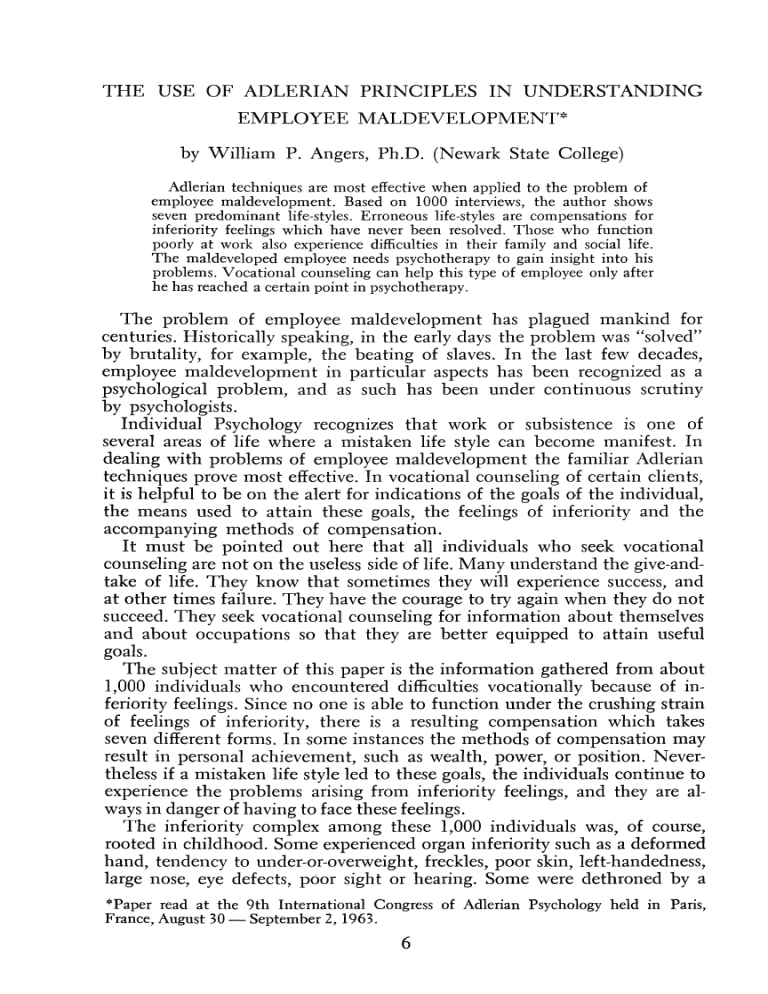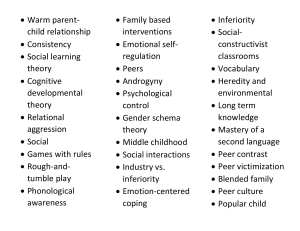
THE USE OF ADLERIAN PRINCIPLES IN UNDERSTANDING EMPLOYEE MALDEVELOPMENrr* by William P. Angers, Ph.D. (Newark State College) Adlerian techniques are most effective when applied to the problem of employee maldevelopment. Based on 1000 interviews, the author shows seven predominant life-styles. Erroneous life-styles are compensations for inferiority feelings which have never been resolved. Those who function poorly at work also experience difficulties in their family and social life. The maldeveloped employee needs psychotherapy to gain insight into his problems. Vocational counseling can help this type of employee only after he has reached a certain point in psychotherapy. The problem of employee maldevelopment has plagued mankind for centuries. Historically speaking, in the early days the problem was "solved" by brutality, for example, the beating of slaves. In the last few decades, employee maldevelopment in particular aspects has been recognized as a psychological problem, and as such has been under continuous scrutiny by psychologists. Individual Psychology recognizes that work or subsistence is one of several areas of life where a mistaken life style can become manifest. In dealing with problems of employee maldevelopment the familiar Adlerian techniques prove most effective. In vocational counseling of certain clients, it is helpful to be on the alert for indications of the goals of the individual, the means used to attain these goals, the feelings of inferiority and the accompanying methods of compensation. It must be pointed out here that all individuals who seek vocational counseling are not on the useless side of life. Many understand the give-andtake of life. They know that sometimes they will experience success, and at other times failure. They have the courage to try again when they do not succeed. They seek vocational counseling for information about themselves and about occupations so that they are better equipped to attain useful goals. The subject matter of this paper is the information gathered from about 1,000 individuals who encountered difficulties vocationally because of inferiori ty feelings. Since no one is able to function under the crushing strain of feelings of inferiority, there is a resulting compensation which takes seven different forms. In some instances the methods of compensation may result in personal achievement, such as wealth, power, or position. Nevertheless if a mistaken life style led to these goals, the individuals continue to experience the problems arising from inferiority feelings, and they are always in danger of having to face these feelings. The inferiority complex among these 1,000 individuals was, of course, rooted in childhood. Some experienced organ inferiority such as a deformed hand, tendency to under-or-overweight, freckles, poor skin, left-handedness, large nose, eye defects, poor sight or hearing. Some were dethroned by a *Paper read at the 9th International Congress of Adlerian Psychology held in Paris, France, August 30 - September 2,1963. 6 more talented or attractive sibling. Others were discouraged to the useless side of life by overbearing or overcritical parents, by lack of satisfactory economic or social status or by lack of family values. In adulthood, the mistaken life style was continued and showed itself in all the areas of life. In the life area of subsistence, every failure experienced reinforced the inferiority complex. It would be well to mention here that in most instances failure was anticipated by the individuals because of their life styles and thus they were thwarted before they even tried. Therefore the following seven forms of compensation became evident since the maldeveloped employee must engage in some type of activity: he must work toward some goal even though it is useless. (1) The organization man. This form of compensation (self-identification by over-affiliations with another individual, group, organization or institution) is very familiar to us today. The press, television and radio decry the fact that our youth is seeking safety first instead of self-expression. Of course, there is nothing wrong with group affiliation so long as the person is also able to function as an individual. Many organizations provide a positive atmosphere for the development and satisfaction of the individual's potentialities. However if an employee becomes disoriented when the organization fails him, (and this may be expressed in a multitude of ways, such as promoting the "wrong" man), then this forn1 of compensation is an expression of maldevelopment. For example, one man who sought vocational counseling had worked his way up through a business firm to the position of vice president. When his company merged with another his position was liquidated. His salary was in the six-figure bracket. One would have expected that a person with enough talent to earn a large salary and to hold a position of importance would be able to translate his past business experience into future gainful and satisfying employment. However this employee had compensated for his inferiority complex by identifying too closely with his organization. Without the organization, he looked upon himself as nothing. Before seeking counseling, he had tried to work at two other jobs, but he was unsuccessful. His loss of self-confidence and courage was manifesting itself in resentment, surliness and defiance which were not tolerated by the employers. (2) The vvork addict. This individual allows himself to develop in only one life area: work. "He is married to his work," some say. Or others remark: "He lives, sleeps and eats his job." The work addict may express himself in exaggerated effort, in extreme attention to detail, in over-production, in over-conscientiousness, etc. The work addict is never satisfied with his own accomplishments. He is insecure and his insecurity shows itself in jealousy of whatever anyone else accomplishes or even thinks. The minute he notices that another person has experienced the slightest bit of occupational growth, he yearns to become like Jack's beanstalk. The work addict brags a great deal because he is afraid someone might notice his inferiority complex instead of his superior vocational accomplishments. Or if he is concerned with details, he befogs everyone around him by over-emphasizing minutiae, or by his "clever" system of check and double-check,' recheck and quadruple-check. 7 On Saturdays, Sundays and holidays, he is in his office even though there is no need for it. He is the first one at work in the morning and the last to leave at night. Needless to say, the other life areas of the work addict suffer from malnutrition to the point of danger. One work addict suffered a severe heart attack. His physician refused to let him return to his job for six months. At the end of this period his health had not improved as the physician had anticipated because the man had no other interests to stimulate him during his convalescence. Eventually, he was allowed to return to a limited work schedule. In a matter of weeks, he was back in his old bad working habits, and he suffered another heart attack. His physician advised a change of occupation, which brought him to the vocational counseling office. (3) The Big-Me, Little-You. Compensation by affecting superiority is another device familiar to everyone. This type of individual masks his inferiority (feeling) complex by belittling others. The man at the desk next to his was promoted because he has an "in" with the boss. Actually his ability is very negligible compared to that of the belittler. Another techniq ue of this type is to destroy another's effort by criticism to hide the fact that he himself could not possibly produce this work. A pertinent example is the boss who redictates every memo or report written by his staff and signs his own name to it. This man has yet to write an original memo or report, but he is expert in correcting the style and grammar of others. Another variation of the proponent of the Big-Me, Little You philosophy is to belittle the ideas and work of others. Then in a couple of weeks he presents the idea or project as his own. A middle-aged man was seen by a personnel consultant at the request of his employers because they were considering firing him. Although his work was satisfactory he could not keep a staff. He had a large family and a seemingly devoted wife. His education was well above average and his accomplishments in his field were notable. He suftered from an inferiority (feeling) complex. His right eye had a slight cast to it, and he appeared self-conscious about it. He also mentioned that his father had constantly reminded him of this physical defect. During his youth playmates teased him about it. This man was a devote of the Big-Me,- Little You philosophy. After a few minutes of conversation he asked the consultant if he. had published any books in psychology. When the consultant said "No," he started to brag about his published works in electrical engineering. During the interview, he would compare himself favorably to the personnel consultant's detriment. He was an impossible supervisor to please because no staff member could ever overcome the Little-You status he imposed upon them in word and deed. (4) The Bad Luck Victim. It is true' that to a certain extent luck enters into success or failure in so far as an opportunity is or is not presented to one or in so far as one grasps or rejects an opportunity. However, to some employees their lack of success is all due to bad luck, which assumes various disguises. For example, a stenographer worked in three different companies in the stenographic pool. Most of her co-workers were promoted to private 8 secretaries, but she never had the good luck to be chosen. Tn the first company, she said that her boss did not recognize her abilities. On the second job, a jealous girl told lies about her to the boss. The third company had too many rules and regulations which inhibited her occupational development. Bad luck in the form of persons or circumstances, she felt, just seemed to follow her. This was true even back in ber school days. The teachers played favorites or else taught so poorly that she never did have the luck to get a good grade in her work. Like any neurosis, it bas its spreading effect. One employee griping about unfair bosses, cheating fellow workers and rigid company rules is soon able to lead a group of complainers. (5) The Pessimist. "\Vby bother," the pessimist preaches, ttsuccess is only an illusion." He himself won't exert any extra effort because he is afraid to face his own short-comings and be also is reluctant to have them bared to the other employees. Another attitude common to the pessimist is: "Why make a fuss. All this was here before I came and it will be here long after I am gone." The paralysis of effort engendered by the pessimistic compensation could bring all civilization to a standstill. Suppose the free world decided that the communist world was too far ahead of it to bother anymore. Or suppose Drs. Salk and Sabin and their sponsoring agencies had taken the stand that polio has always been unconquerable and always will be. (6) The Faker. The adage ttyou can know a man by the company he keeps" is rebutted by the faker, who hides his inferiority by pretending to be what he is not. He dresses like the world's best salesman, but the figures of his sales last year do not support this pose. He talks as if he could solve the traffic problem, but he cannot put words into action. He knows all the most influential people in tovvn, but do not ask him to get a favor for you. He lives in the best part of town in a beautiful house, but do not ask him to pay a bill. And above all, do not expect him to hold the same job for any length of time because a company cannot afford the luxury of keeping a man who does not produce business on its payroll. (7) The Fantasist. In his daydreams the fantasist is equal or superior to those about him. He is leading a productive, enriching life. He experiences the glow of success. Failure does not exist. On the surface, the nlaldeveloped employee appears to be a personnel problem. He is described in various ways: lazy, hard to get along with, pompous, disgruntled, lacking initiative, etc. It is often thought that some psychological testing and a couple of interviews with a psychologist will solve the problem. While it is true that some cases of maldevelopment can be corrected once the psychologist is able to pinpoint the trouble, in the vast majority of cases intensive psychotherapy is indicated to help the employee gain some insight. As has been noted in the presentation of the seven forms of compensation, the maldeveloped employee can in some instances perform notably as far as producing work is concerned, but he is a source of trouble because he cannot get along with people. He arouses hostility and resentment and destroys initiative. Thus whIle he may produce, he stifles the productive nature of other employees. 9 In other examples, the maldeveloped worker does not produce because his inferiority (feeling) conlplex paralyzes his effort. He doesn't try to succeed and he uses his energies to discourage those about him or to encourage them to be like he is - a waster of time. A person suffering from an inferiority (feeling) complex not only functions poorly in a work setting, but also in family and social life. He is like a note out of tune on a piano. He makes the" melody sound discordant. And eventually he manages to put many of the other notes out of tune too. The maldeveloped employee needs psychotherapy. He must gain insight to his feelings of inferiority. He must be able to understand the necessity for setting worthwhile goals so that he can live a useful, productive, whole life. Vocational counseling can help this type of employee, but only after he has reached a certain point in psychotherapy. Once the employee with the help of therapy has been able to recognize his inferiority feelings and his ways of compensating for them and once he crosses the threshold into the world of social interest, then the vocational psychologist is able to help him choose worthwhile occupational goals. 59 Leroy Place Red Bank, N. J. 07701 10









